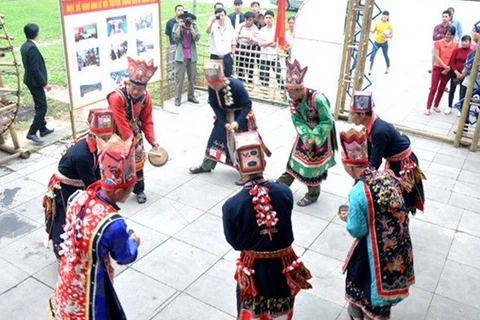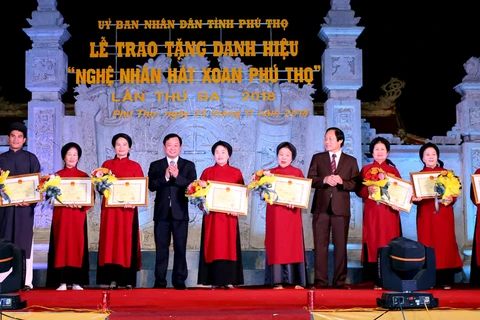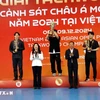Phu Tho (VNA) – Xoan-singing clubs in the ancestral land of Phu Tho have become busier welcoming both domestic and foreign tourists after the folk genre of music was added to the UNESCO List of the Intangible Cultural Heritage of Humanity in late 2017.
After only a 90-minute drive from Hanoi and tourists will find themselves in the place believed to be the cradle of the whole Vietnamese nation where, apart from Xoan singing, they can explore local relic sites.
Nguyen Thi Lich from the An Thai Xoan-singing club said her troupe serves from 2-3 groups of tourists during weekends.
“We are very glad as many tourists have joined us in singing,” she said.
In the past, very few young people liked traditional Xoan singing. However, the art has now attracted not only youths in Xoan singing villages but also those from across the province, said Nguyen Van Quyet from the Kim Dai Xoan singing club.
In order to promote values of Xoan singing and attract more visitors, in April 2018, Phu Tho launched a tourism product named “Xoan singing in ancient village”, which is integrated in daily tours operated by travel companies.
The Xoan-singing venues have, to date, welcomed over 13,000 visitors, mostly from foreign countries like the UK, France, the Netherlands and the US.
According to the provincial Department of Culture, Sports and Tourism, travel companies have launched from 2 to 3 tours for foreign visitors to Phu Tho each month, which take them to the Xoan-singing sites.
Dong Duc Cuong, Director of Asia Lotus Travel Company, said the product is one of the spotlights of the tours to Phu Tho, adding that alongside the Xoan-singing venues, tourists also have chances to visit many ancient communal houses, temples and villages.
Phung Thi Hoa Le, Director of the provincial Tourism Promotion Centre, said artisans and members of the four Xoan-singing clubs perform at Lai Len temple and Hung Lo, An Thai and Kim Dai communal houses in Viet Tri city as part of the tours.
Xoan performances are also staged from from 2-4pm at Hung Lo communal house every day, and from 2-4pm at Lai Len temple every Saturday and Sunday.
During the Hung Kings Temple Festival - one of the biggest of the year held in the third lunar month, Xoan performances will take place from 8am – 4pm every day in the above venues.
Nguyen Dac Thuy, Director of the provincial Department of Culture, Sports and Tourism, said the province is paying more attention to preserving and promoting the heritage values of Xoan singing.
Twenty out of the 30 cultural sites for Xoan singing have been upgraded and the number of experienced artisans, from seven to 100, he said.
The province now boasts 34 provincial clubs with more than 1,500 members, along with 64 district-level and 42 communal troupes.
The UNESCO Inter-governmental Committee for the Safeguarding of the Intangible Cultural Heritage decided to remove Xoan singing from its List of Intangible Cultural Heritage in Need of Urgent Safeguarding and added to the Representative List of the Intangible Cultural Heritage of Humanity during its 12th session in December 2017.
As a performing art, Xoan performances include singing, dancing, drumming and clapper beating. Closely linked to the worship of the Hung Kings, believed to be the founders of the nation, Xoan singing traditionally performed during the first two months of the lunar calendar at holy places such as temples, sanctuaries and communal houses. Tourists can feel another magnet finding that the worshiping itself is another UNESCO-recognised intangible cultural heritage of the humanity.
There are three forms of Xoan singing: worship singing for the Hung Kings and village guardian spirits; ritual singing for good crops, health and luck; and festival singing where villagers alternate male and female voices in a form of courtship.-VNA
VNA
























